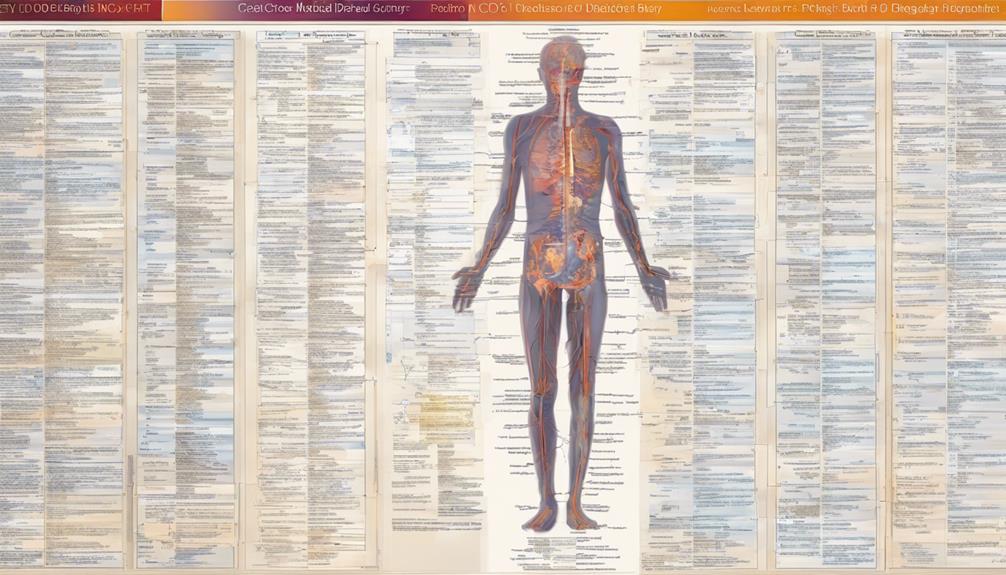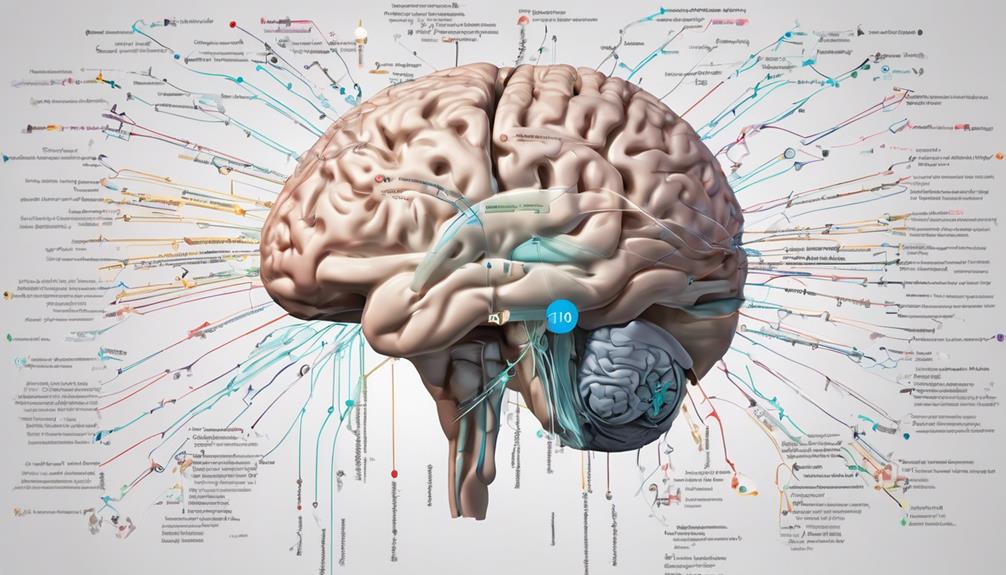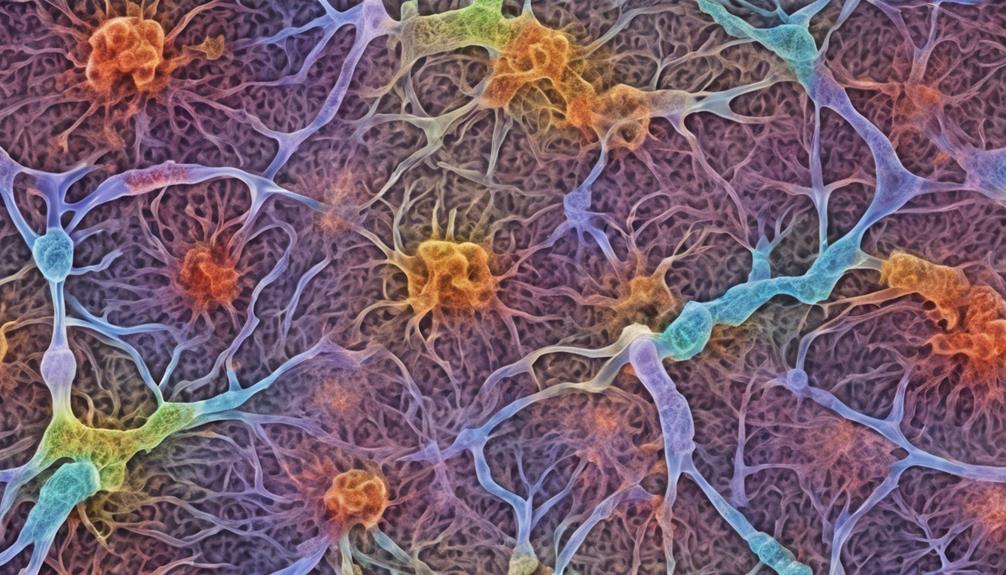Imagine a situation in which a patient displays symptoms such as reduced cognitive function, hallucinations, and difficulty concentrating. These signs may suggest the existence of Lewy Body Dementia, a complicated condition that leads to the deterioration of nerve cells.
Understanding the nuances of ICD-10 coding for this condition is paramount for accurate diagnosis and appropriate management. By exploring the intricacies of assigning the correct code, healthcare professionals can ensure tailored care plans, facilitate interdisciplinary communication, and enhance the overall quality of patient outcomes.
The significance of utilizing the specific ICD-10 code for Lewy Body Dementia goes beyond mere categorization; it serves as a crucial tool in the intricate landscape of healthcare delivery.
Key Takeaways
- G31.83 primary ICD-10 code for Lewy body dementia.
- F06.7 used for mild neurocognitive disorders.
- Accurate coding aids in treatment planning.
- Proper coding vital for effective management.
Overview of Lewy Body Dementia ICD-10 Codes
In identifying and categorizing Neurocognitive Disorder with Lewy Bodies, referred to as Lewy body dementia, the ICD-10 code G31.83 plays a pivotal role. This specific code serves as a crucial tool for accurate diagnosis and differentiation from other forms of dementia within healthcare data analysis.
Additionally, understanding the significance of using additional codes such as F06.7 for mild neurocognitive disorders due to known physiological conditions is imperative in ensuring comprehensive patient care.
Proper utilization of Excludes1 notes is essential to prevent the assignment of inappropriate codes, particularly when distinguishing conditions like dementia with Parkinsonism from Lewy body dementia. Healthcare professionals must pay meticulous attention to detail when coding for Neurocognitive Disorder with Lewy Bodies to facilitate precise treatment planning and effective management of this complex disorder.
Key ICD-10 Codes for LBD Diagnosis

The identification of key ICD-10 codes crucial for diagnosing Lewy body dementia, also known as Neurocognitive Disorder with Lewy Bodies (LBD), is integral to accurate classification and treatment planning in healthcare settings. The primary ICD-10-CM code for LBD is G31.83, which specifically addresses this neurocognitive disorder with Lewy bodies. Utilizing this code aids in distinguishing Lewy body dementia from other diseases, facilitating precise diagnosis and appropriate treatment strategies. Additionally, incorporating supplementary codes such as F06.7 for mild neurocognitive disorders due to known physiological conditions is essential for comprehensive LBD coding. Understanding and adhering to the Excludes1 note that prohibits assigning dementia with Parkinsonism under the G31.83 code is crucial for accurate coding practices in LBD cases. Ensuring accurate ICD-10 coding for Lewy body dementia is vital for maintaining detailed medical records, facilitating correct billing procedures, and securing proper reimbursement.
| Category | ICD-10-CM Code | Description |
|---|---|---|
| Lewy Body Dementia | G31.83 | Neurocognitive Disorder with Lewy Bodies |
| Additional Code | F06.7 | Mild neurocognitive disorders due to known conditions |
Understanding Neurocognitive Disorder With Lewy Bodies
Understanding the pathology of neurocognitive disorder with Lewy Bodies involves analyzing the presence of abnormal protein deposits in the brain known as Lewy bodies. In the context of coding and classification, this condition falls under the code G31.83 in the ICD-10 system, specifically categorized as Neurocognitive Disorder with Lewy Bodies.
Individuals with Lewy body dementia may experience cognitive impairment, visual hallucinations, fluctuations in alertness, and motor symptoms such as stiffness and tremors. Accurate documentation and precise coding of Lewy body dementia are essential for proper diagnosis, effective treatment, and advancement in research efforts.
Adhering to coding guidelines is crucial to ensure the accurate classification and management of this complex condition. By understanding the intricate nature of Lewy body dementia and the role of abnormal protein deposits in its pathogenesis, healthcare professionals can provide better care and support to individuals affected by this neurocognitive disorder.
Implications of Secondary Parkinsonism in ICD-10 Coding

Implications arise in ICD-10 coding when addressing secondary Parkinsonism, necessitating accurate differentiation from primary Parkinson's disease for precise classification. Secondary Parkinsonism falls under specific diagnosis codes in the ICD-10 system (G31.0-G31.83 and G31.85-G31.9) to distinguish it from other diseases of the nervous system. Proper coding of secondary Parkinsonism excludes conditions like Reyes syndrome (G93.7) to ensure a clear identification of the underlying physiological condition. Understanding these distinctions is crucial for healthcare providers in diagnosing and treating patients with mild neurocognitive disorders. By utilizing the correct diagnosis code for secondary Parkinsonism, healthcare professionals can contribute to more accurate healthcare data analysis and research insights, ultimately leading to better patient care. Below is a table summarizing the key points related to secondary Parkinsonism in ICD-10 coding:
| Key Points | Importance |
|---|---|
| Differentiation from primary Parkinson's disease | Essential for accurate classification |
| Exclusion of specific conditions | Ensures precise identification |
| Aid in diagnosis and treatment | Facilitates proper patient care |
| Contribution to healthcare data analysis | Enables research insights |
Managing Unspecified Dementia in ICD-10 System
Addressing dementia with Lewy bodies (G31.83) of unspecified severity in the ICD-10 system allows for comprehensive documentation of cognitive impairments, including behavioral disturbances. When managing unspecified dementia in the ICD-10 system, it's essential to consider the following:
- Unspecified dementia in ICD-10 enables coding for dementia with Lewy bodies (G31.83) of unspecified severity.
- Coding for dementia NOS with Lewy bodies (G31.83) includes options for behavioral disturbances, aiding in a more thorough assessment.
- Proper ICD-10 coding for unspecified dementia ensures accurate identification and reporting of cognitive impairments, ultimately facilitating appropriate care and treatment.
Frequently Asked Questions
What Is the ICD-10 Code for Dementia With Lewy Bodies?
The ICD-10 code for Dementia with Lewy Bodies is G31.83, known as Neurocognitive Disorder with Lewy Bodies. It helps in accurate diagnosis and differentiation from other forms of dementia.
Proper coding is vital for management and research. Healthcare providers benefit from understanding G31.83 for precise documentation and treatment planning.
What Is the Lewy Body Dementia?
Lewy body dementia is a neurodegenerative disease that affects cognitive function, often leading to memory loss, visual hallucinations, and motor problems resembling Parkinson's disease. It can be challenging to diagnose due to symptom overlap with Alzheimer's and Parkinson's.
The disease impacts daily life by affecting memory, thinking, and movement. Management involves a multidisciplinary approach to improve symptoms and quality of life for those affected.
What Is the ICD-10 Code for Dementia With Behavioral Issues?
We know the ICD-10 code for dementia with behavioral issues is G31.83, specifically for Neurocognitive Disorder with Lewy Bodies. This code helps in identifying and tracking cases of dementia with Lewy bodies, aiding in appropriate management strategies.
Dementia with behavioral issues may present symptoms like changes in alertness, hallucinations, and muscle stiffness. It's crucial to use additional codes for specific behavioral disturbances associated with dementia for accurate coding.
Proper documentation and accurate coding are essential for effective patient care.
What Is the ICD 9 Code for Lewy Body Dementia?
When looking for the ICD-9 code for Lewy Body Dementia, it can be found under 331.82, falling into the category of Other Specified Degenerative Diseases of the Nervous System.
This code system was replaced by ICD-10 in 2015, allowing for more detailed and specific disease coding.
Accurate coding of conditions like Lewy Body Dementia is crucial for proper diagnosis, treatment, and healthcare data analysis.
Conclusion
In conclusion, navigating the complexities of Lewy Body Dementia ICD-10 coding is akin to charting a course through a vast and intricate medical landscape. By utilizing the key codes for LBD diagnosis and understanding the nuances of neurocognitive disorder with Lewy bodies, healthcare professionals can effectively manage this condition and provide optimal care for patients.
Precision in coding is paramount for accurate diagnosis, treatment planning, and further advancement in research for this challenging disease.









